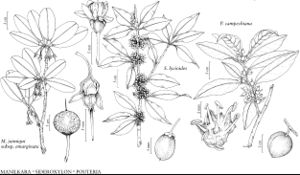Manilkara
Fam. Pl. 2: 166, 574. 1763, name conserved ,.
Shrubs or trees. Stems not armed, tomentose or glabrous. Leaves persistent, alternate; stipules present or absent; petiole present; blade: base rounded to cuneate, apex retuse to acuminate, surfaces hairy or glabrous. Inflorescences fascicles or solitary flowers. Flowers: sepals 6 in 2 whorls of 3, outer valvate, darker, abaxially densely hairy; petals 6 [–9], white or yellow, glabrous or sparsely hairy, lobes undivided, shorter than or exceeding corolla-tube; stamens 6 [–12], distinct [basally connate with staminodes]; staminodes [absent or 1–] 6 [–12], alternate with stamens, erect or incurved, petaloid, triangular-lanceolate, glabrous or hairy; pistil 5–12 [–14] -carpellate; ovary 5–12 [–14] -locular, glabrous or hairy; placentation axile or basiventral. Berries brown [yellow-green, orange, red, black, or purple], ellipsoid or depressed-globose to subglobose, glabrous. Seeds [1–] 2–10, brown, laterally compressed; hilum linear; embryo vertical; endosperm present. x = [12,] 13.
Distribution
Fla., Mexico, West Indies, Central America, South America, Asia, Africa, Indian Ocean Islands (Madagascar), Pacific Islands
Discussion
Species ca. 65 (2 in the flora).
Species of Manilkara are used as sources of latex for nonelastic rubber. The wood is dense and hard, useful for bridge pilings (fresh water), wheel spokes, posts, railroad ties, etc. Seed extracts have been used as antihelminthics and in ophthalmics.
Selected References
None.
Lower Taxa
Key
| 1 | Leaf blades: apex acute to acuminate (often folded on pressed specimens); corolla tubes equaling or exceeding lobes; fruits 35-80 mm; fruiting pedicels slightly enlarged distally. | Manilkara zapota |
| 1 | Leaf blades: apex retuse (older leaves often split on pressed specimens); corolla tubes shorter than lobes; fruits 25-40 mm; fruiting pedicels conspicuously enlarged distally. | Manilkara jaimiqui |
